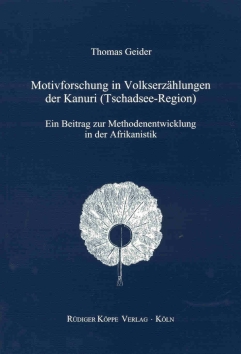
Motivforschung in Volkserzählungen der Kanuri (Tschadsee-Region)
Ein Beitrag zur Methodenentwicklung in der Afrikanistik
Author: Thomas Geider †. Series edited by: Wilhelm J.G. Möhlig †.
Series: WK Verbal Art and Documentary Literature in African Languages Volume 17
2003424 pp.
1 map, 2 illustrations, numerous tables and figures
Text language(s): German
Format: 160 x 240 mm
760 g
Paperback
€ 69.80
Buy 'Motivforschung in Volkserzählungen der Kanuri (Tschadsee-Region)' as a downloadable PDF document directly from our online shop »
Order 'Motivforschung in Volkserzählungen der Kanuri (Tschadsee-Region)' as print edition »
Whereas research in African oral literature has hitherto focused on individual languages and cultures, the author of the present study aims to develop a method to isolate recurrent narrative elements for inter-lingual and inter-cultural comparative research. Drawing on the methodologies developed by thematic, typological and motif research in the fields of folklore, cultural anthropology and literary studies, the author transfers them to Africanistics. Special emphasis is placed on the original linguistic manifestation of the texts which determines form and content of the transregionally important comparative units.
The study is based on 32 selected folk tales passed on among the Kanuri in north-east Nigeria and the bordering lake Chad region featuring heroic characters like the enfant terrible and the witch hunter. Structural analysis of the stories yields linguistic elements and narrative motifs that are further defined and evaluated in the context of Kanuri oral literature and culture.
In his conclusion, the author places his results in a broader West-African context that has been established in particular by French studies in African oral literature. He argues that this new methodology provides Africanists with the ability to conduct comparative research in oral literature.
Following the link below you will also find a paper collection in memoriam of Thomas Geider (* 25 April 1953, † 15 October 2010):
Accompanying material:
- Advances in Kanuri Scholarship
(ISBN 978-3-89645-104-0 ) - Afrikaner schreiben zurück
(ISBN 978-3-89645-053-1 ) - Die Figur des Oger in der traditionellen Literatur und Lebenswelt der Pokomo in Ost-Kenya
(ISBN 978-3-927620-60-5 ) - From the Tana River to Lake Chad – Research in African Oratures and Literatures
(ISBN 978-3-89645-836-0 ) - Lexikon der afrikanistischen Erzählforschung
(ISBN 978-3-927620-64-3 ) - Trommeln in der Kirche
(ISBN 978-3-89645-917-6 )
Cross-reference:
- African Languages in Global Society / Les langues africaines à l’heure de la mondialisation / Lugha za Kiafrika kwenye enzi ya utandawazi
(ISBN 978-3-89645-259-7 ) - African Media Cultures – Cultures de médias en Afrique
(ISBN 978-3-89645-246-7 ) - Afrophone Philosophies
(ISBN 978-3-89645-251-1 ) - Beyond the Language Issue
(ISBN 978-3-89645-819-3 ) - Chanter l’existence
(ISBN 978-3-89645-287-0 ) - Framing Texts – Framing Social Spaces
(ISBN 978-3-89645-742-4 ) - Kanuri, Borno and Beyond
(ISBN 978-3-89645-892-6 ) - Life is a Thriller
(ISBN 978-3-89645-830-8 ) - Rewriting Yusuf
(ISBN 978-3-89645-177-4 ) - Sprachen und Sprachzeugnisse in Afrika
(ISBN 978-3-927620-95-7 ) - Swahili-Handbuch
(ISBN 978-3-927620-06-3 ) - The Voice of the Text and its Body
(ISBN 978-3-89645-739-4 )
Reviews
Uta Reuster-Jahn in Fabula, 46/2005, 159-161
The dissertation [i.e. habilitation thesis, the publisher] by Thomas Geider is a real achievement, both as a documentary and as an original, well-informed and highly inspiring scientific work.
Stanislaw Pilaszewicz in Studies of the Department of African Languages and Cultures, 35/2004, 52-56
In seiner Habilitationsschrift legt Thomas Geider eine gelungene Verbindung von Motivforschung in der Kanuri-Erzählliteratur mit einer textvergleichenden Methode für die Afrikanistik vor. [...]
Um der strukturellen Komplexität einer afrikanischen Erzählung gerecht zu werden, ist ein interdisziplinärer Ansatz nötig. Geider zeigt auf, welche Fächer zu einer fachübergreifenden Erstellung einer vielschichtigen afrikanistischen Analysemethode in Frage kommen, nämlich die Afrikanistik selbst, die Ethnologie, die Folkloristik und die Literaturwissenschaft.
Daniela Waldburger in Afrika und Übersee, 86/2, 2003, 305-310
| « back | Print version | [top] |
 Books
Books Audio
Audio Biographies
Biographies Series
Series Festschrifts
Festschrifts Journals
Journals